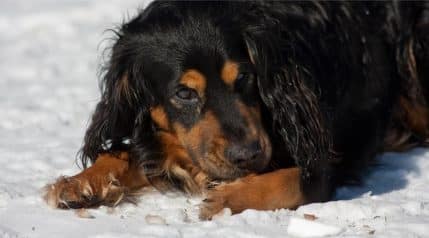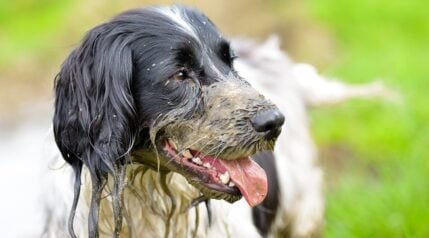If you’ve ever noticed a dog snacking on a long blade of grass, you might have wondered why on earth an animal that has evolved to hunt and eat meat can sometimes be found grazing like a horse or cow, although much less efficiently! Some dogs even take it to the extreme and start eating other things like wood or sticks, which can have serious health implications.
With that being said, grass-eating can happen with almost any breed of dog. It doesn’t matter if it’s a smaller breed like a Yorkie or a really large dog like an American Mastiff. Almost every breed is susceptible to chomping down on some grass if left alone to explore their independence in your yard or at the park.
Most people who own a dog end up asking this question at some point or another, and coming to the internet or going to their vet for an answer. Interestingly enough, it’s actually a question that has puzzled vets and scientists for a long time and we still don’t have all the answers. But we do know some things! Let’s look at what they are!
It’s Not Just Sick Dogs

Historically, it was thought that dogs only ate grass when they were ill, in order to make themselves vomit. The theory was that the dogs instinctively knew they needed to make themselves sick, so they’d chow down on grass. The long fronds tickled the throat and esophagus, triggering the vomiting reflex.
The problem with this theory is the evidence doesn’t add up. In one study, owners were asked whether or not their dog ate grass, and whether they were sick afterward. Only 22% of dogs eating grass proceeded to be sick. And only a very small proportion was showing signs of illness before they started eating the grass. Another study found similar results, with less than a quarter of dogs being sick after eating grass, and all dogs being well before eating grass.
Although we can’t completely discount the historical theory, it seems more likely that we haven’t hit on the real reason yet. Other theories include that the grass corrects a minute nutritional deficiency, that it’s a way for dogs to gather extra information about the dog that previously toileted there, or that it’s a natural wormer. We don’t know. What we can agree on, though, is that it’s probably normal in the vast majority of cases. We also know that it’s typically not common for a dog to eat grass when suffering from physical ailments, like a torn ACL.
Five Reasons Dogs Eat Grass

While the information below isn’t intended to be all-inclusive, there are usually only five reasons that dogs eat grass. Below you’ll find each reason as well as an explanation of why your pup may be eating its share of green goodies when they head outside.
Habit And Instinct
Although we don’t know why dogs eat grass, we do know it’s not just our domesticated dogs that do it. Examination of the feces of wild dogs and wolves has shown that grass can be found in their scat up to 70% of the time. This suggests there must be some widespread instinctual reason that dogs might choose to eat grass.
Some studies on chimps have shown that they eat indigestible plant matter as a way to naturally get rid of worms- the tangles of plants move straight through the digestive system, taking everything with it when they leave. It has been suggested that eating grass is an instinct designed to cleanse a dog’s guts of worms, but there is no scientific evidence for this at the moment.
Scent
Dogs often prefer to chew on the long fronds that wave in the wind- the same long fronds that are a choice target for other dogs to urinate and scent-mark on. So, there is a suggestion that taking the grass into the mouth may be a more effective way of ‘gathering’ the scent and information from the grass.
Again, there’s no real evidence for this- and I know for a fact my dog prefers the grass growing in the greenhouse, where no other dog has been.
Nausea
There may be some truth in the historical theory that dogs eat grass to make them sick. After all, we know that some dogs do show signs of being unwell before going outside to eat grass, although it was only 8% in one study. Whilst grass-eating appears to be normal for the vast majority of dogs, for those that are routinely sick after eating grass it may indicate a problem.
Causes of nausea that could make your dog want to eat grass include pancreatitis, stomach upsets, diabetes, fever, and IBD. However, it’s important to look at a picture of your dog as a whole; not all dogs that eat grass are ill, so if your dog isn’t showing any other signs of illness, they’re probably fine.
Nutritional Deficiency
Pica is the official term for eating non-food items, and it has been linked to nutritional deficiencies. The theory is that the dog instinctually recognizes a need for a vitamin or mineral and consumes this in the form of grass. There are a couple of problems with this theory. One is that grass passes through the dog’s digestive tract almost entirely undigested- so the nutritional value is probably very low. A second problem with this theory is that the vast majority of dogs are on a complete and balanced diet that should be providing all of their nutritional needs. Individual batch problems notwithstanding, these diets are formulated to avoid nutrient deficiency- yet dogs are still eating grass.
If your dog is being fed a boutique diet, you could try switching to a different formulation- ideally to a brand that conducts feeding trials. These brands not only calculate that their food is balanced by checking the profile of each ingredient added, but they also periodically feed a cohort of dogs their food and measure the actual uptake of nutrients to ensure that dogs can process the diet as intended.
This is the best way to ensure that a diet is complete and balanced and therefore can’t be resulting in a nutrient deficiency. Some dry kibbles aren’t as nutrient-dense, so it’s smart to look for foods that are formulated specifically for a dog’s age, especially true in older dogs.
Snacking And Hunger
Most vets agree that dogs eat grass as part of their normal lifestyle. Since so many dogs do it, and wild dogs and wolves too, it suggests that it’s a deep-rooted instinct. Many vets suspect dogs simply like the taste! If they are picky eaters, they may shy away from eating normal food and chew on grass instead.
One study gave a selection of dogs the opportunity to eat grass and watched them. It found that dogs were more likely to eat grass before they ate their daily meal, and they were also more likely to eat grass in the morning than in the afternoon. This suggests there may be a hunger aspect to eating grass.
Frequently Asked Questions
Is My Dog Sick?
The vast majority of dogs are not ill when they eat grass. This suggests that, although some dogs will eat grass when they’re ill, the vast majority will not. So, eating grass does not necessarily mean your dog is sick. Instead, you should look for other clues that your dog is not feeling well. Do they have a good appetite? Are their energy levels normal? Are they restless? Are they drinking a normal amount? Are they putting themselves in the ‘prayer position’? Getting to know your dog’s normal behavior is important so that you can spot problems sooner. If you think your dog isn’t quite right, it’s worth talking to your vet for advice.
Do Other Carnivores Eat Grass?
Yes! Wild dogs and wolves eat grass, as do cats! In fact, most carnivores are found snacking on grass every now and again. We don’t have any more insight into the reasons behind these other species eating grass than we do for dogs.
Is Eating Grass Harmful?
It is unlikely that eating grass will harm your dog. However, there are some exceptions and times to worry. Some dogs will eat too much grass, which can cause a blockage in their intestinal tract. This can make dogs very ill and emergency surgery may be needed. If your dog appears to be eating a significant amount, you should contact your vet for advice.
Some dogs may eat grass instead of their food. Whilst missing a meal won’t harm most dogs, eating so much grass that they’re not interested in dinner is suggestive of a deeper problem. It’ll also cause problems in the long run, as grass cannot be properly digested by dogs so contains very few nutrients that they can utilize. Not only would a dog doing this quickly start to lose weight, but they would also start to get nutrient imbalances which can cause problems. If you think your dog is eating grass instead of his food you should contact a vet.
Of course, some grasses are safer than others. If your dog is known to like to snack on grass, keep a close eye on which grass they’re eating. Grass on roadsides carries lots of pollutants that could be harmful to a dog. Even more concerning is the grass that has been sprayed with weed-killers like Roundup, moss-killers, pesticides, or even fertilizer. Many of these compounds are toxic to dogs and cause a wide range of effects from seizures to death.
Don’t forget that some things that look like grass from a distance may not, in fact, be grass. Bluebells, daffodils, and other spring bulbs can have grass-like clumps, but these contain toxins that often make dogs ill. Similarly, poisonous plants can be hidden in a clump of grass so it’s wise to be cautious.
If you know or suspect your dog has eaten grass containing toxins or toxic plants, you should contact your vet or an animal poison line for advice.
It’s important to remember that most dogs like snacking in long grass- this is a common place for ticks to hide, waiting to latch on. You should ensure your dog has up-to-date flea and tick prevention, especially if they’re prone to snacking. Eating grass is also one way that dogs can catch worms and diseases such as parvovirus- so you should make sure your pet is wormed regularly and is up to date on his vaccinations, too.
When Should I Worry About My Dog Eating Grass?
Most dogs that eat grass will suffer no ill effects. You’ll notice grass in the stool a day or two later, and your dog will have been his normal self throughout.
However, you should worry if your dog seems to be continually eating grass, or if they’re eating more grass than dog food. You should also worry if your dog shows other signs of being ill, such as vomiting more than once, diarrhea, abdominal pain, or lethargy.
Some dogs have been known to eat grass when their stomachs are dilating- a dangerous situation that often results in Gastric-Dilation-Volvulus or GDV. Symptoms include continually retching or vomiting but without producing any vomitus. This is an emergency situation and these dogs should be taken straight to the vet.
Although rarer in dogs than in cats, it is possible for dogs to get a piece of grass stuck at the back of their throat, which causes a sneeze, cough, or repetitive swallowing. This needs to be removed surgically, so if you spot any of these signs you should take your dog to the vet.
Can I Stop My Dog Eating Grass?
If your dog is showing no signs of illness, has a complete and balanced diet, and only snacks on grass occasionally, it’s likely that they’re normal. Stopping them from doing normal behavior is not necessary and- in some cases- can be harmful, so it’s worth chatting this over with your dog trainer before deciding to intervene. Bitterant sprays and training techniques can help to stop dogs for whom grass-snacking is becoming a problem.
Final Thoughts
While we’ve covered a lot of ground and most likely found at least one of the reasons your pup might be snacking on grass, we always recommend that you take your dog to your local vet if you have questions. While we can give advice, you know your dog better than anyone and can often judge if your pup doesn’t feel well.





